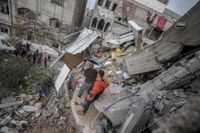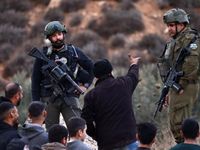On Monday, March 24, 2025, Ghassan Abdel Basset and his family left their home in the occupied West Bank to visit a relative, intending to break their fast together during the holy month of Ramadan. However, later that evening, they received alarming news from neighbors: Israeli settlers had invaded their home. Ghassan rushed back to confront the settlers, but the Israeli army intervened, blocking him and his family from returning to their house. The settlers claimed they had purchased the home, but Ghassan firmly stated, “The settlers claim they bought the house from someone, but nobody gave this person the legal right to sell our house.” He expressed hope, saying, “God willing, we will follow the legal procedures [in Israel], and the law will take its course.”
The situation in the West Bank has become increasingly dire. Israel's occupation of Palestinian territory is deemed illegal under international law, which prohibits an occupier from transferring its citizens into occupied areas or enforcing its national laws there. Nevertheless, over 750,000 Israeli settlers currently reside in illegal settlements across the West Bank. A recent report by human rights groups Peace Now and Kerem Navot revealed that Israeli settlers now control 14 percent of Palestinian land in the West Bank, with about half of that land confiscated since December 2022. This escalation has coincided with Israel's intensified land annexations and evictions following the outbreak of conflict in Gaza in October 2023.
According to Diana Mardi, a researcher with the Israeli human rights group Bimkom, “There are a lot of tools settlers use to cause the displacement of Palestinians.” She noted that settlers often resort to violence to force Palestinians to abandon their homes. The report highlighted that at least 60 percent of Palestinian herder communities have been uprooted from their lands since 2022, with 14 illegal outposts established on land previously inhabited by Palestinian farmers and Bedouins.
Leith, a Palestinian farmer from a village east of Ramallah, shared his experiences, stating that settlers frequently attempt to seize farmland by vandalizing crops and blocking access to Palestinian farmers. “To protect their families, they have to leave the area. Many of them have children that they need to keep safe, but they lose their main source of income [from farming] when they leave,” Mardi explained. Leith added, “The settlers are trying to take over our land. When the army is present with armed settlers, that means it’s not easy. It’s not easy for us to resist.”
The United States' foreign policy has also been criticized for emboldening Israel's settler movement. Omar Rahman, an expert on Israel-Palestine relations, pointed out that the Trump administration's actions have created a climate of impunity for settlers attacking Palestinians. He emphasized that the former president's administration abandoned any pretense of supporting human rights or the aspirations of an independent Palestinian state. Rahman noted, “The other aspect is that Trump is surrounded by people who are not just backers of Israel but of ‘Greater Israel.’ That means they believe the land biblically belongs [exclusively] to Israelis.”
After Trump's inauguration on January 20, 2017, he signed an executive order lifting sanctions on settlers previously deemed “extremists” by the prior administration. This order came just one day after a temporary ceasefire was established in Gaza, and the following day, settler attacks surged throughout the West Bank.
In the aftermath of the violence, Palestinians displaced from their homes have begun to trickle into nearby villages or relocate to urban centers under the control of the Palestinian Authority. Leith reported that five or six families have moved into his village after being expelled from their farms post-October 7, 2023, the date marking the beginning of the ongoing Gaza conflict. Despite the growing fears of settler attacks, Leith vowed to remain in his village, expressing frustration at the perceived indifference of the international community. “Nobody cares about human rights. Human rights is just one big lie,” he lamented. “Animals have more rights than us.”
In a separate but equally tragic development, on Friday, March 28, 2025, Israeli occupation forces bombed a house in the Al-Zeitoun neighborhood, southeast of Gaza City, resulting in the deaths of 14 Palestinians, including women and children. According to the Palestinian news agency WAFA, the attack occurred at dawn when Israeli warplanes targeted a house on Kashku Street in Al-Shujaiya. Eyewitnesses reported that several victims remained trapped under the rubble, raising concerns that the casualty count could rise.
In addition to this incident, two Palestinians were killed in an airstrike targeting a gathering in Al-Shawka, east of Rafah. The violence continued in Khan Younis, where two Palestinians, including a young girl, were injured when Israeli forces bombed a house in Bani Suheila, east of the city. Loud explosions echoed across northern Gaza and in Tel Al-Sultan, west of Rafah, as the Israeli military demolished residential buildings, further escalating the humanitarian crisis.
As the situation unfolds, the impact on Palestinian communities continues to be devastating. The relentless cycle of violence, coupled with the ongoing displacement of families, paints a grim picture of life under occupation. The international community remains divided on how to address the escalating conflict, with many calling for urgent intervention to protect the rights of Palestinians and uphold international law.





